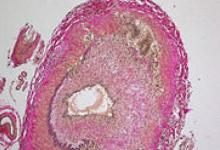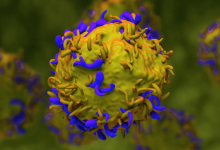What's Your Diagnosis? Truncal Rash, Arthritis and +ANA Save
An 80 year old woman complains of 3 months of rash on her back. It is modestly pruritic. The lesions are both annular and papular appearing over her back, torso and upper arms. She also complains of pain and swelling in her fingers. She has a past medical history of heart failure, ventricular tachycardia, GERD, peripheral neuropathy, and pancreatitis from amiodarone. Her current medications include metoprolol, gabapentin, and omeprazole.
Exam is notable for annular lesions without central scarring. Labs revealed a ANA+ 1:640 speckled pattern, +SSA, WBC 3.6, absolute lymphocyte count of 800 cells/mm3, hematocrit of 36% and platelets of 254,000. She was started on hydroxychloroquine by another rheumatologist who diagnosed her with elder-onset lupus, yet she has not improved after 3 months.
What is your diagnosis?
Diagnosis: Drug-induced subacute cutaneous lupus erythematosus (SCLE)
SCLE is an autoimmune chronic lupus skin disorder, notable for its association with SSA (anti-Ro) antibodies in association with a psoriasiform or annular rash, usually seen in sun-exposed areas of the arms and trunk.
Since 1985 it has been recognized that SCLE may be induced by certain medications, especially thiazide diuretics (hydrochlorthiazide), proton-pump inhibitors (omeprazole), include calcium-channel blockers (diltiazem), ACE inhibitors, TNF inhibitors, terbinafine, interferons (alpha and beta-1a), paclitaxel and docetaxel.
A recent review of 117 cases of drug-induced SCLE showed this mostly occurs in women, with a mean age of 58 yrs. The most common offending agents were antihypertensives and antifungals. The time intervals between drug exposure and appearance of the rash varied greatly, but most cases spontaneously resolved within weeks of drug withdrawal. Ro/SS-A autoantibodies were present in 80% of the cases. No significant differences in the clinical, histopathological or immunopathological features between drug-induced SCLE and idiopathic SCLE were observed.










If you are a health practitioner, you may Login/Register to comment.
Due to the nature of these comment forums, only health practitioners are allowed to comment at this time.